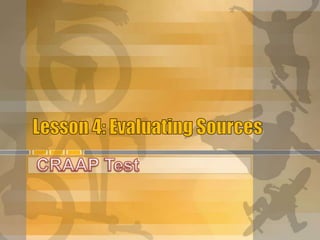
Lesson 4: Evaluating Sources
- 2. • When YOU do a Google search, HOW do you decide what results are good? • What would help you be better at evaluating information?
- 3. Ability to evaluate ANY type of information source to see if it meets your needs
- 5. • Most students consider FORMAT to be THE most important criterion for selecting sources • Joe Student: “INTERNET is best!!!” • “A source should be judged for what it contains, NOT how it is stored or produced” (Quaratiello, 2011, p. 21).
- 7. “While evaluating the information you find in books and periodicals is important, evaluating web-based material is absolutely crucial” (Quaratiello, 2011, p. 20).
- 9. Often hard to tell: 1. WHO wrote the info 2. WHO published the info 3. HOW accurate it is 4. WHERE they got their info 5. WHEN it was posted
- 10. • Relevance/Credibility Model • CARS Model •CRAAP Test
- 12. • Currency • Relevance • Authority • Accuracy • Purpose
- 15. • DATE the item was published (or last updated)
- 16. •Is the information current enough for your research needs?
- 17. •Is the most current information always the best?
- 18. MOST CURRENT • Science • Health/medicine • Business OLDER SOURCES • Historical topics • Humanities • Literature When do older sources work well?
- 20. • Does the information relate appropriately to your topic or help answer your research question? • Who is the intended audience?
- 21. • WHOM is it written for? • Consider your own level of knowledge in selecting a source.
- 22. • Is it at a level that you can understand and use? –Too easy –Too difficult Ask yourself: Would you be comfortable citing this source in your research paper?
- 24. • QUALIFICATIONS of the writer - Image copyrighted by Wikimedia foundation
- 25. • Expert in field/ subject matter expert • “Peer review” • On websites: Look for About link • Contact information – Publisher – Email address
- 26. • .com • .org • .edu • .gov
- 28. • Different types of sources pull their information from different places. • The type of source can give you an idea of where the information they used came from.
- 29. At what stage of the cycle of information was your source written? And what does this mean?
- 31. • As an event occurs, you get live reporting and footage. • Immediately after an event, you get more reporting and eyewitness accounts. • The further away from an event that you get, the more ANALYSIS you will find. • News Analysis • Expert Analysis • Scholarly Analysis
- 32. • Are the sources listed? – Are they scholarly? – Are they popular? – Are they credible? – How old are they? • Can they be checked?
- 33. A source with verifiable sources of information
- 34. • Has the information been reviewed or refereed?
- 35. “With clear documentation, a reader can hypothetically check the ACCURACY of a given source”(Quaratiello, 2011, p. 29).
- 37. • Absence of errors – spelling, grammar, typos
- 39. • WHY the item was written
- 40. Entertain
- 41. A source that is informational and unbiased.
- 42. POINT OF VIEW • Every source is going to have a point of view. • Does the author tell you his/her point of view? • Are both sides presented? • Is information presented fairly? BIAS • Some sources have a BIASED point of view. • Is one side presented exclusively or far more than the other? • Is charged or emotional language used?
- 44. • Evaluate what a simple Google search on your topic provides • Practice using the CRAAP Test – Evaluate the 2 Web sources you found last week
- 45. • Practice using the CRAAP Test on scholarly sources • Evaluate – Scholarly Journal Article – eBook
- 46. • Find a scholarly journal article on your topic using Google Scholar – Cite it in MLA or APA – Evaluate it using CRAAP Test
- 47. • Keep | Start | Stop • List ONE thing you would like your instructor to KEEP, START, and STOP doing. • List ONE thing YOU would like to KEEP, START, and STOP doing in order to do well in this course.
- 48. Quaratiello, A. (2011). The college student’s research companion: Finding, evaluating, and citing the resources you need to succeed (5th ed.). New York, NY: Neal-Schuman.
